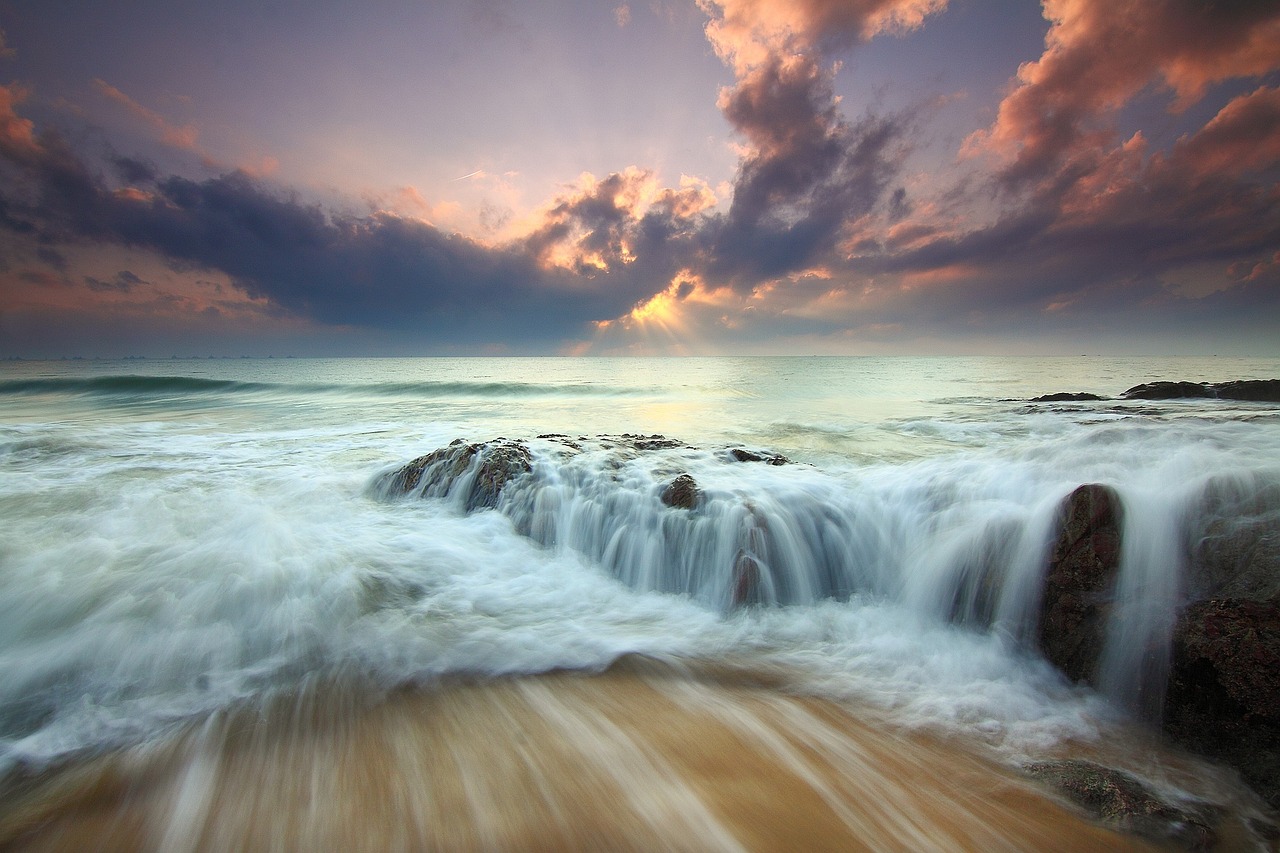Swim, Sink, Float, Splash: English Water Verbs
In this post we’ll look at English verbs related to water: how people move in and on it, and how it moves.
Moving Through or Into Water
To swim is of course to move through the water, either in it or on top of it. Living things swim: people swim, fish swim, animals swim. Swim is an irregular verb: swim, swimming, swam, swum. The gerund is swimming, and the verbal noun is (a) swim.
- Everyone is swimming in the pool.
- Can you swim? / Do you know how to swim?
- My dog loves to swim. He swims every time he sees water.
- Swimming is a popular sport. I love swimming.
- We swam in the lake all day.
- I’ve never swum in the sea.
- Let’s go for a swim! I had a great swim this morning.
To sink is to fall through the water, towards the bottom. Sink is also irregular: sink, sinking, sank, sunk. You’ll also see the adjectival form sunken, to describe something that is resting at the bottom of the ocean or a lake. But as a verb, you should always use (have/has) sunk.
- If you stop moving your legs in the water, you’ll sink.
- I dropped my phone into the pool and it sank to the bottom.
- Several boats have sunk already in this storm.
- They say that there’s sunken pirate treasure somewhere near this island.
To dive means to move downward through water, or into it. The difference between jumping into water and diving into water is that when you dive, your hands and arms are ahead of you, and they enter the water first. Dive is regular (dive, diving, dived, dived), but the past tense form dove is also very common in Canada and the US.
- She ran and dove/dived into the pool.
- The submarine dove/dived beneath the waves and disappeared from sight.
- Many birds fly into the water and dive to catch fish.
- I’ve never dived from the highest diving board, because I’m afraid of heights.
Glide can mean to move through the air or water. If something is gliding, it’s not propelling itself with hands, legs, or fins, it’s simply moving through water or air because of its own momentum. To glide is regular: glide, gliding, glided, glided.
- The boy is gliding through the water in the deep end of the pool.
- Stingrays are beautiful when they glide through the water.
- I kicked off the end of the pool and glided into the middle.
Moving On Top of Water
To describe something that is on top of the water but not (fully) in it, the most common verb is float. Float is regular: float, floating, floated, floated.
- Wood floats on water.
- There are some ducks floating on the pond near the dock.
- We floated in the pool for most of the afternoon.
- I wonder where this bottle has floated from before it came here.
- This boat is not in good shape. I doubt it can even float!
To bob (bobbing, bobbed, bobbed) is similar to float, but it suggests that something is not moving in any direction, that it’s just moving up and down with the movement of the water. Bob is often used with up and down. In fishing, a bobber is small plastic ball attached to the fishing line that doesn’t sink. If the bobber moves suddenly, you know that a fish has bitten.
- The duck is bobbing up and down on the waves.
- Bill’s out there by the dock. I can see his head bobbing up and down.
- We didn’t really swim much, we just floated and bobbed in the waves.
- The bobber is moving! I think you caught something!
To sail (sailing, sailed, sailed) is to move or be driven across the top of water by a sail, in other words pushed by the wind. A sailboat is a kind of boat that has a sail.
- Before planes, people had to sail across the oceans, which took a very long time.
- We sailed from Miami to the Bahamas.
- They decided not to sail today because the weather was bad.
- The wind is perfect for sailing right now.
To row (rowing, rowed, rowed) is to move a boat by means of two oars, two long poles that are wider at the end in the water. A rowboat is a kind of boat that is moved by rowing.
- We had a small rowboat when I was a child.
- Have you ever rowed all the way across the lake?
- They rowed carefully across the river.
- Pat’s arms are tired from rowing so much.
- Row, Row, Row Your Boat is a very common children’s song.
Paddle (paddling, paddled, paddled) is similar to row. The difference is that you usually use two oars when you row, so you sit and use both arms. You paddle with just one arm, for instance in a canoe or kayak. The instrument that you use to paddle is also called a paddle. You can also use paddle to describe the way that a person swims using two cupped hands. This is often called doggy paddle, because it’s very similar to the way that dogs swim. The idiom to be up the creek without a paddle means to be in trouble, to be in a difficult situation without the tools that you need to fix it. (A creek is a small river.)
- We got in the kayaks and paddled out to the island.
- Paddle harder! We’re going to hit those rocks!
- We need to get a new paddle for the canoe, because I lost it.
- Children usually first learn to doggy paddle before they learn to swim.
- If we run out of gas out here in the desert, we’ll really be up the creek without a paddle.
The expression to tread water means to float or bob in the water, keeping yourself afloat by gently kicking your arms and legs. When you tread water, you’re staying in one place and not really moving ahead. For this reason, the idiomatic expression to tread water means to remain stuck in one place without making any forward progress. Tread is irregular: to tread, treading, trod, trodden. But in the expression tread water, regular verb forms are usually used: to tread water, treaded water.
- If you fall into the lake, just tread water until someone comes to help you.
- They floated far out in the pond and treaded water for several minutes.
- The economy has slowed down, and many businesses have just been treading water.
- Alex treaded water for a few years after college while deciding what he wanted to do with his life.
How Water Moves
There are many common verbs that describe the movement of water. The most common one is to flow (flowing, flowed, flowed), which simply means to move in a general direction, usually because of gravity.
- The Hudson River flows past the island of Manhattan.
- We stood on the bridge and watched the water flow underneath us.
- The creek is really flowing after all of the rain we had!
- The Gulf Stream is a major ocean current that flows northeast toward Europe.
The verb run (running, ran, run) is very similar to flow. It conveys a sense of speed, just like the verb run when it refers to how a person moves with is or her feet. It can also be used for smaller amounts of liquid, for example what happens when you spill a glass of water.
- Several small rivers run through the valley.
- Every time it rains, water runs down our chimney. We need to fix the roof!
- I spilled wine on the counter and it ran down the side onto the floor.
- The creek isn’t really running now because we haven’t had any rain recently.
- Something has run down the side of the stove. Please clean up after you cook!
If water moves in small drops rather than in a continuous line, use the verb drip. Drip is regular: drip, dripping, dripped, dripped.
- We need to fix the kitchen faucet. Water has been dripping out of it for weeks.
- I hear water dripping somewhere.
- Something dripped from the bottom of my car.
- Be careful! Oil is dripping off of your pizza onto the carpet!
When water leaks (leaking, leaked, leaked) it gradually moves into or out of something. If you have a boat, you definitely do not want it to leak! When something (a boat, a pipe, a bottle) is leaky, it has a small hole that allows water or other liquids in or out.
- After we hit the rock, water leaked into the boat.
- Be careful with this bag, it’s leaking something.
- Whenever it rains, water leaks through the roof.
- We have a leaky pipe. Can you call a plumber?
If to leak is to move slowly, to gush (gushing, gushed, gushed) is to move very quickly. When water or another liquid gushes, it moves very quickly, in large amounts, with a lot of force and energy.
- When the pipe burst, water gushed out.
- Gary cut his finger and blood gushed out.
- The boat had a huge hole in its side, so water came gushing in.
- You left the window open in the storm! Rain is gushing into the house!
To seep (seeping, seeped, seeped) means to move very slowly, typically through something else. Water may seep through dirt, through paper, through cloth, or anything else that isn’t waterproof.
- The kids dug a big hole on the beach, and water seeped into the bottom of it.
- It’s so hot today! Sweat is seeping through my shirt.
- You need to change your bandage. Blood has seeped through it.
- Grease from the hamburger seeped through the paper plate.
The verb splash (splashing, splashed, splashed) describes water that moves through the air after being pushed, for example by a wave or by someone’s hands. It can be intransitive (no direct object, as in water splashes), or it can be transitive (with a direct object, as in to splash water onto someone). The verbal noun is a splash, commonly used in the expression to make a splash. This can be used literally, or idiomatically. In the idiomatic sense, it means to create a big sensation, to be very popular.
- Water splashes up from the front of the boat every time we hit a wave.
- Tommy jumped into the pool and splashed everyone sitting nearby.
- Don’t splash me! I don’t want to get wet!
- When the rock fell into the water it made a big splash.
- Stephanie’s books always make a huge splash. She’s a very popular author.
If water sloshes (sloshing, sloshed, sloshed), it moves around inside something, hitting against the sides. If you imagine the sound that water makes as it bounces around inside of a barrel or bucket, that’s sloshing. To be (completely) sloshed means to be drunk.
- I tried to carry the pot full of water carefully to the sink, but hot water sloshed out onto the floor.
- Some soup sloshed out of my bowl when I filled it.
- We thought the barrel was empty, but we heard some kind of liquid sloshing around inside of it.
- Jake always gets completely sloshed at parties. He drinks too much!
Use to sprinkle (sprinkling, sprinkled, sprinkled) if the amount of water being splashed is very small. A sprinkler is a device to shoots small amounts of water out, for example to water a lawn or to put out a fire. Sprinkle can be intransitive (no direct object, as in water sprinkles) or transitive (with a direct object, as in to sprinkle water/vinegar/salt/etc. onto something.)
- It didn’t rain very much, just enough to sprinkle a few drops onto the garden.
- The cook sprinkled some salt and fresh pepper on the pasta.
- If there’s a fire, the sprinkler system will come on automatically.
- We’re in a drought, so it’s illegal to use a sprinkler on the lawn.
If you’re talking about waves, the two most common verbs are to break (breaking, broke, broken) and to crash (crashing, crashed, crashed). When a wave breaks, it reaches its tallest point and begin to fall forward. When a wave crashes, it reaches the land and surges up the beach.
- The waves are breaking out at the sandbar.
- The surfers wait at the point where the biggest waves break.
- A huge wave crashed and rushed up the beach.
- I love the sound of crashing waves.
If water laps (lapping, lapped, lapped) at something, very small, gentle waves touch it. Crashing is loud and violent, but lapping is very gentle and soft. The related verb to lap something up means to gently collect water and lift it, for example what a dog does with its tongue while drinking.
- I love the sound of the water lapping against the side of the boat. It’s so calming.
- Small ripples lapped gently against the rocks at the side of the lake.
- The dog lapped water up from his bowl.
To ripple (rippling, rippled, rippled), or to make/form ripples means to make very small waves that move outward in a series of circles.
- If you through a stone into a pond, it will make ripples.
- Small waves are rippling out from where the fish jumped.
- The bay if perfectly still and calm, except for occasional ripples causes by fish or other animals.
Finally, the rhythm of higher and lower water caused by the moon is called tide. High tide is when the water is highest, and low tide is when the water is lowest. When the tide is getting higher, we say that it is coming in. When the tide is getting lower, we say that it is going out.
- Is the tide coming in or going out?
- The tide is coming in quickly, so we need to move our beach blanket higher.
- When the tide goes out, the island is connected to the mainland by sandbars.
Get on the road to better English with the Language Garage!
We hope you’ve enjoyed learning about English water verbs. If you’d like to learn more:
- Create a free Language Garage account to access tons of English vocabulary, grammar, and culture.
- Follow us on Facebook, LinkedIn, BlueSky, Twitter, Threads, Mastodon Instagram, or Pinterest. We publish lots of English vocabulary, grammar, and culture notes, so it’s a great way to pick up some new vocabulary and practice.
- Check out our other posts on English language, culture, and more.
- Enroll in affordable, flexible, and personalized private online English lessons or sign up for a small group online English class.






